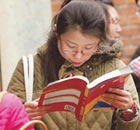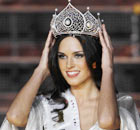Global General
Turnout for Iraq election solid at 62%
(Agencies)
Updated: 2010-03-09 00:55
 |
Large Medium Small |
BAGHDAD – Turnout in Iraq's parliamentary election was 62 percent, higher than in last year's provincial ballot, despite attempts by Sunni Islamist insurgents to disrupt the vote with attacks that killed 38, officials said on Monday.
Preliminary results were not expected for another day or two in a poll that Iraqis sickened by violence hope will help bring better governance and stability after years of sectarian slaughter, as U.S. troops prepare to withdraw.
Turnout reached 62 percent, said Hamdiya al-Husseini of Iraq's Independent High Electoral Commission (IHEC).
|
||||
Prime Minister Nuri al-Maliki's State of Law list said it was on course for victory in Baghdad and Iraq's Shi'ite south, a claim that could not be verified but which, at least in the south, appeared to be backed by informal, early vote tallies.
"The State of Law Coalition list is leading among other lists in Baghdad and other southern provinces," said Ali al-Dabbagh, government spokesman and State of Law candidate.
Lawmaker Haider al-Ebadi, a State of Law candidate and member of Maliki's Dawa party, said initial results suggested the coalition was ahead in 10 provinces.
"But the special voting and voters abroad, this has not been concluded yet and could alter the outcome," he said.
There were 272,016 expatriate voters, IHEC said, compared to expectations that more than one million Iraqis might vote overseas. Most Iraqis abroad are believed to be minority Sunnis and their votes could be crucial for the chances of a secular, Shi'ite-Sunni alliance headed by former premier Iyad Allawi.
The scale of the Sunni vote will indicate whether Sunnis feel they have a real stake in Iraq's nascent democracy after the shock of the U.S.-led 2003 invasion, when they lost their relatively privileged position under Saddam Hussein.
Many Sunnis felt targeted when a Shi'ite-led panel vetoed around 500 candidates, including a top Sunni politician, before the vote, for alleged links to Saddam's outlawed Baath party.
Sunnis felt under-represented after the 2005 election for a full-term parliament, which sealed the grip on power of majority Shi'ites and minority Kurds oppressed by Saddam. Turnout in the Sunni province of Anbar was 61 percent, IHEC said.
MALIKI'S STIFF CHALLENGE
Maliki faces a stiff challenge from his former Shi'ite Islamist allies grouped in the Iraqi National Alliance (INA).










